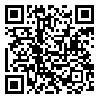Articles In Press
Back to the articles list |
Back to browse issues page
1- Associate Professor, Department of Educational Sciences, Payame Noor University (PNU), P.O.Box 19395-4697, Tehran, Iran
2- Assistant Professor, Department of Educational Sciences, Payame Noor University (PNU), P.O.Box 19395-4697, Tehran, Iran
3- Instructor, Department of Educational Sciences, Payame Noor University (PNU), P.O.Box 19395-4697, Tehran, Iran
2- Assistant Professor, Department of Educational Sciences, Payame Noor University (PNU), P.O.Box 19395-4697, Tehran, Iran
3- Instructor, Department of Educational Sciences, Payame Noor University (PNU), P.O.Box 19395-4697, Tehran, Iran
Abstract: (133 Views)
The aim of this survey is to study the status of environmental literacy components (environmental knowledge, environmental skill, environmental attitudes, sensitivity to environmental issues) among faculty members and students of Payame Noor University. This study is applied in terms of purpose and causal-comparative in nature and was conducted in survey. The statistical population is all faculty members of Payame Noor educational sciences department and its e-learning students in the academic year 98-97. 372 students and 86 faculty members were selected by stratified random sampling. Independent t-test results showed that there were significant differences among environmental factors between students and faculty members regarding environmental knowledge components, environmental attitudes, sensitivity to environmental issues, while there was no significant difference between students and faculty members in environmental skills component. The results of the Friedman test on the ranking of environmental literacy components also showed that both groups of faculty members and students jointly select environmental knowledge as their first priority, and then the faculty members ranked environmental attitudes and environmental behavior respectively. They chose their second priority, while the second and third students were opposite of them, and both faculty and students chose environmental sensitivity as their top priority. Finally, because of the importance of education in environmental literacy, it is recommended that specialized courses on environmental education be held for students and university faculty with an emphasis on environmental sensitivity.
Keywords: Environmental Knowledge, Environmental Skill, Environmental Attitude, Sensitivity to Environmental Issues of Students, faculty members, Payame Noor University.
Send email to the article author
| Rights and permissions | |
 |
This work is licensed under a Creative Commons Attribution-NonCommercial 4.0 International License. |






.jpg)
